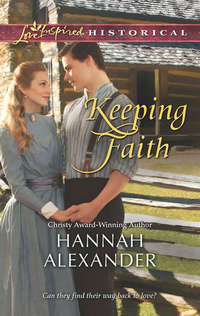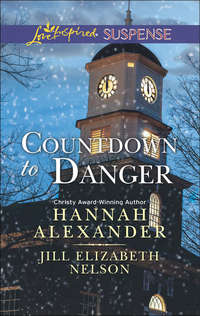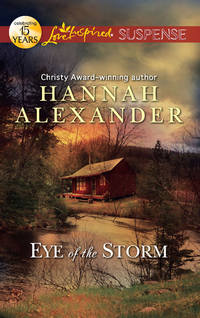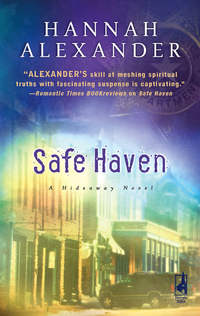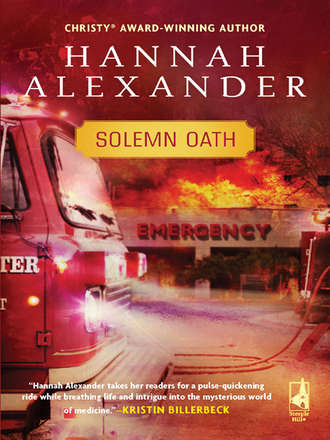
Полная версия
Solemn Oath

Critical Praise for
HANNAH ALEXANDER’S
Novels
SOLEMN OATH
“ Solemn Oath absolutely hit the ball out of the park. Hannah Alexander is going to have a hard time writing fast enough to keep up with reader demand.”
—Debi Stack
SACRED TRUST
“Alexander is great at drawing the reader into her story line and keeping them hooked until the resolution of the plot.”
— Christian Retailing
A KILLING FROST
“Running dialogue and a few twists will keep romantic suspense fans coming back for more.”
— Publishers Weekly
DOUBLE BLIND
“Native American culture clashes with Christian principles in the freshly original plot.”
— Romantic Times BOOKreviews
GRAVE RISK
“The latest in Alexander’s Hideaway series is filled with mystery and intrigue. Readers familiar with the series will appreciate how the author keeps the characters fresh and appealing.”
— Romantic Times BOOKreviews
FAIR WARNING
“The plot is interesting and the resolution filled with action.”
— Romantic Times BOOKreviews
Solemn Oath
Hannah Alexander

We wish to thank Joan Marlow Golan and her
excellent staff for giving us this opportunity to share
our books with a new reading audience.
Contents
Prologue
Chapter One
Chapter Two
Chapter Three
Chapter Four
Chapter Five
Chapter Six
Chapter Seven
Chapter Eight
Chapter Nine
Chapter Ten
Chapter Eleven
Chapter Twelve
Chapter Thirteen
Chapter Fourteen
Chapter Fifteen
Chapter Sixteen
Chapter Seventeen
Chapter Eighteen
Chapter Nineteen
Chapter Twenty
Chapter Twenty-One
Chapter Twenty-Two
Chapter Twenty-Three
Chapter Twenty-Four
Chapter Twenty-Five
Chapter Twenty-Six
Chapter Twenty-Seven
Chapter Twenty-Eight
Chapter Twenty-Nine
Epilogue
Questions for Discussion
Prologue
L eonardo the lion lay cold in his cage. Splotches of rusty red-brown stained his coat around a bullet wound in his right side, and a grown man’s sobs echoed against the concrete wall that protected Leonardo’s inner sanctum.
Cowboy Casey knelt beside his pet, forehead pressed against the stained velvet shoulder, tears dampening the tawny fur. “My friend…why?”
With callused fingers he tested the stiffness of the lion’s well-fed ribs. Rigor mortis. The killer had probably struck before dawn, when Cowboy was taking his autumn load of exotic animals to the station for shipment.
“Who would do a thing like this? What kind of a cruel…” Cowboy knew the answer before the question completely formed in his mind. The muscles in his jaw hardened, and his teeth ground together as he fought against a sudden, overwhelming rage. “Berring!”
He exhaled an angry gush of air and jerked to his feet to pace across the cage. Of course Berring. Two weeks after that madman had moved into the neighboring farm this summer, a gaping hole mysteriously appeared in the bison pasture fence. Thank goodness for three brave buddies with herding skills.
Berring had also called the sheriff out twice in the past month with some wild-haired story about Leonardo roaming the woods at night. The sheriff knew better, and so did every farmer in Knolls County. Cowboy had never put his neighbors in danger from the powerful animals he raised on his ranch.
He pivoted and walked across to hunker down once more beside the big cat. Leonardo had been his most faithful pal for the past four years, in spite of the roughhousing that had gone too far and sent him to the E.R. a few times. It wasn’t Leonardo’s fault he had jaws with the impact of a backhoe.
And it wasn’t his fault a crazy man had been turned loose with a gun.
“He won’t get away with it, my friend,” Cowboy said as he grabbed up his hat and strode from the cage.
Off-duty fireman Buck Oppenheimer stepped through the front entrance of his favorite convenience store, the Pride of Knolls. He unfolded a ten-dollar bill to pay for his gasoline, looking around for Roxie, the regular weekday clerk. The place was deserted.
“Hey, Rox!” His voice carried over the tops of tightly packed shelves toward the back of the store. “Put your cigarette out and get back to work. Break’s over!”
He grinned to himself, waiting for her usual sharp comeback. He and Roxie had an ongoing rivalry about who could give the best insult. Roxie usually won, because Buck had been raised to treat all women like ladies. And Roxie was no lady.
There was no reply, but sure enough, he did smell smoke. He always smelled smoke in here. All the old farmers ignored the signs plastered by management on the windows and the front of the counter, and Roxie was the worst offender of the bunch. She always stated proudly that she’d been smoking two packs a day for fifty years, and management could fire her if they wanted. She’d been here for the past ten years. Truth was, management was scared of her.
But sixty-year-old Roxie didn’t come plunging through the squeaky swinging doors from the back the way she always did. Buck listened for the sound of a toilet flushing or of Roxie shuffling boxes around in the back. Could be she hadn’t heard him come in.
“Roxie?” He sniffed again and noticed that the smoke was stronger.
And different…sharper.
“Roxie!”
A faint popping, rushing, cracking sound reached him, then a heavy thump…and a muffled cry that sounded like a tomcat meowing.
A wisp of smoke slithered into the shopping area between the twin stockroom doors.
“Help!” came the tomcat’s voice again. It was Roxie.
Buck ran out the door and the few feet back to his truck. He radioed for backup, then grabbed his fire-resistant jacket and his ax and raced back in through the swinging doors into the storage area. Bright tongues of flame raced along a stack of cardboard boxes that surrounded a smoking barbecue grill in the far corner.
“Roxie, where are you?” he shouted, covering the lower part of his face with his arm to protect his lungs from the heat and smoke.
“Help me! I’m in here with the fire extinguisher!” The thumps came from his right, on the other side of a solid wooden door that led to a smaller storage room. “This door’s stuck again, and it’s getting smoky in here! Hurry!”
“Stand back, Rox, I’m going to force it open.”
“Who’s out there?” she demanded. “Buck, that you?”
“Yes, stand back!”
He knew there wasn’t a whole lot of room in there to move around, much less stand back. He rammed his shoulder against the door and bounced hard against it. “Is it unlocked?”
“Of course!”
He shoved again, this time putting his full muscle-builder’s weight against it, but he bounced from the wood once more as a slice of pain streaked down his right arm. He coughed at the thickening smoke.
The fire quickened with sudden life. Snapping heat puckered his flesh, and the smoke twisted and bunched around him as if it were alive. He struggled not to breathe too much of the dark thickness. He stood back from the door, raised his ax and slammed the blade into the wood above the knob. Roxie squealed. When he plunged forward with his shoulder this time, the door splintered and gave way with him and he tumbled in.
“Hurry!” Roxie shouted. “There’s a barbecue grill that could—”
A loud sound like the boom of a cannon reached them, and the wall beside them imploded. Sudden, sharp pain pierced Buck’s chest just before he grabbed Roxie, threw her beneath him, and fell over her. A shelf of paper towels toppled onto them as another blast hit.
Through the blackness and heat and smothering smoke, he heard the welcome sound of a siren. His friends would come through.
Downtown Knolls, Missouri, held the picturesque quality of one of those postcards they sold in the ancient Ben Franklin store on the northeast corner of the square. Early autumn barely touched the lush growth of maple and oak trees with kisses of gold and rust. The three-story brick courthouse in the center of the square rose up from its broad landscape of green grass and evergreen hedge like a graceful sculpture. Across the street Arthur and Alma Collins stepped out of Little Mary’s Barbecue with their sandwiches and home fries.
“I never could figure out how they can say the food is homemade when the café isn’t home to anybody,” Alma chattered to Arthur, her dark gold, naturally wavy hair reflecting the sun’s warm rays. Her eyes held the same golden glow, highlighted by a gleam of anticipation as they ambled across the street toward the courthouse lawn. Their destination was a group of picnic tables settled deeply beneath the shade of the trees, where the rest of their tour group gathered.
“I mean, they make the buns at the café, don’t they?” Alma stepped over the curb, taking care to walk on the sidewalk and not the grass. “Not at home in their own kitchens. They should say ‘made from scratch’ or somethin’. I tried to explain that to a waitress while you were orderin’, but I don’t think she appreciated it.” The deep, warm tones of Alma’s voice betrayed the Southern heritage of her parents and mingled in an interesting way with the Spanish accent she and Arthur had both picked up during their years of missionary service in Mexico.
Arthur couldn’t suppress a grin at his wife. This tour was a rare treat for both of them, but especially for Alma. Where they lived there were no antiques stores, no modern grocery stores, no medical care. They didn’t even have electricity in the small village where they’d been building a new church for the past year. Alma had worked hard alongside him, loving the people who struggled just to feed their children, teaching them safer cooking habits and hygiene as she told them about the new life they could find in Christ.
“Where do you want to go after we eat?” he asked. “We have a whole afternoon to explore before we load onto the vans again.”
Alma’s smile broadened. She laid a hand on Arthur’s arm. “There’s an antiques shop down a block from the secondhand bookstore, and I know Phyllis and Shirley wanted to see if they—”
A squeal of tires from the street behind her cut off her words. Her eyes widened in alarm as she spun around, instinctively reaching for her husband.
Arthur gasped at the sight of a big black Plymouth careening around the corner of the square, going clockwise on the one-way, counterclockwise street. The car hit the curb and jumped it with a squeal of springs, rumbling toward them with evil intent.
“Oh my goodness…Arthur, look out!”
Arthur grabbed Alma’s shoulders and jerked her toward him.
He caught sight of a dark head slumped over the steering wheel just before the front tires dug into the lawn. Alma screamed as the heavy bumper slammed into the backs of her legs and thrust her against Arthur. A confusion of tearing pain and terrified cries collided with jumbled bits of sky and ground. Picnic tables and people scattered across the broad lawn.
Everything ended abruptly with the crash of metal against concrete.
Cowboy saw the gleam of dark steel from the barrel of the .22 rifle just before it exploded with fire and sound, ripping into his right upper arm and shoving him sideways with the force of its blast. He cried out with pain and surprise as his body slammed against the front porch railing.
Berring, greasy haired and scowling, slung the screen door wide open and followed the gun out onto the porch. “Get off my property or I’ll blow that arm off next time!” he growled in a voice that could cut tin cans in two with its gritty depth.
Blood oozed out between Cowboy’s fingers as he gripped the bullet wound. He gaped at the man. Cold shock washed through him as he stared at Leonardo’s murderer—and maybe his own.
Sharp, angry pain raced through his arm and shoulder. He stumbled backward down the steps of the porch. Berring raised his gun, took aim again and fired a booming shot that sent a bullet whizzing past Cowboy’s left ear.
Cowboy pivoted and plunged into the thicket of woods beside the littered front yard. This was crazy! Things like this didn’t happen in Knolls. He stumbled over roots and limbs, twisted his foot in a hole but caught himself and kept running.
Berring’s voice came closer. “How does it feel, zookeeper?” The machine-gun fire of laughter followed. “How does it feel to be afraid? Why don’t you turn around and face me like a man?”
Another shot rang out, along with the wicked thud of tearing wood and the crackle of footsteps through briars and poison ivy. Cowboy tripped through a thicket of gooseberry bushes and danced across oak tree roots to keep from falling on his face. A bullet whisked barely an inch over his head before he could straighten again. For a desperate second he considered turning and facing his attacker and trying to wrestle the rifle from him, but the sudden sound of a John Deere tractor echoed through the trees.
Yes! He remembered! Old Mr. Gibson was plowing his south twenty today.
Cowboy plunged from the protective stand of forest and ran across the unbroken ground, waving his good arm. Mr. Gibson caught sight of him and casually waved back, then frowned and stopped his tractor as Cowboy drew nearer.
“What happened this time, Jacob?” the old farmer called out. “That lion try to eat you again, or did one of those ostriches finally get a kick at you?”
“Berring shot me.” Barely breaking stride, Cowboy leaped onto the tow bar behind the big back wheels of the small farm tractor. “Can you get me to the hospital? And we’d better call the sheriff. That man’s dangerous!”
Mr. Gibson blinked at Cowboy, then something caught his attention from the edge of the woods. Cowboy cast a panicked glance over his shoulder and saw the maniac run out of the forest shadow and stop to stand at the edge of the field, glaring at them, rifle tucked beneath his left arm.
Mr. Gibson didn’t ask any questions, just pulled back the clutch and steered the tractor out of the field. “Guess the plowin’ can wait.”
Chapter One
K nolls Community Hospital, settled within the autumn-dusted elegance of a Knolls residential section, gave new arrivals the impression of serenity with its pink granite two-story structure and thick evergreen landscaping. The emergency and outpatient areas formed a wing jutting out from the building westward, looking like an arm reaching out to welcome patients in. Two hundred fifty health-care personnel, food service and housekeeping providers and office workers earned their living here. They gave quality care to up to sixty patients on the floor. Family physicians’ offices clustered close, circling the main structure in a large section of acreage. The hospital administrator, Mrs. Estelle Pinkley, ruled with the firm hand of a hardheaded, hard-nosed grandmother, whom almost everyone in the county knew and loved.
Dr. Lukas Bower, the unwilling temporary director of Knolls Emergency Department, depended on Mrs. Pinkley to help him handle staff and make executive decisions. In the meantime he took every opportunity to convince her that he was a doctor, not an administrator. If the future of Knolls Community Hospital depended on his interdepartmental skills, the jobs of two hundred fifty people stood in the shadow of death.
Today, however, the third Monday in September, Lukas gave even less thought than usual to paperwork and verbal sparring. The ambulance radio had just blared out the news of a bad accident involving a car and a tour group down on the square. At least five people, including the driver of the car, were being brought in, several of them serious.
Lukas released the switch that had sent his voice over the radio to the paramedic on scene and turned with growing restlessness to locate his staff. Judy, the slender secretary with short salt-and-pepper hair, sat at the computer and spoke on the telephone to a patient who had been treated and released last night.
Lukas picked up his own phone at his workstation at the large oblong central E.R. control counter and dialed Surgery. He told the nurse to keep a surgery suite open until he knew for sure if it would be needed. He hung up and turned around to find Lauren McCaffrey, RN, stepping back into the E.R. from an early lunch break. Good. He needed her.
Lauren stopped to joke with one of the housekeepers, peered over Judy’s shoulder to see what was on the computer screen, then glanced over at Lukas. She caught sight of his expression, and her characteristic smile disappeared.
“What’s up, Dr. Bower?” She hurriedly stashed her purse beneath the desk and tied her long blond hair back into the ponytail she wore for work.
“Accident coming in,” he said. “Several injuries. Apparently a group of pedestrians took on a car with a drunk driver.”
She nodded. “Why does stuff like this always happen at lunchtime? I’ll go make sure the trauma rooms are ready, and I’ll break out the gear for the staff.”
“Thanks, Lauren. Has Claudia gone to lunch?”
“Yes, but she may be back in the break room. I think she brought her lunch today.” Lauren shook her head as she turned and walked toward the trauma rooms. “Mrs. Pinkley’s a smart lady,” she called over her shoulder. “I bet she knew double nursing coverage would increase business.”
Lukas looked over to find the secretary off the phone. “Judy, would you please call upstairs for an extra nurse, and then contact Dr. Richmond. She’s medical backup for today, and I need her.”
“You sure?” Judy asked, peering at him over her reading glasses. “I talked to her secretary a few minutes ago, and they’re up to their eyeballs in walk-ins over there at the clinic.”
“Tell her I’m sorry, but it looks like we have some bad ones coming in.” He turned toward the trauma rooms to make sure Lauren had all the gear the staff would need.
He knew Mercy Richmond’s practice was doing well, and he was glad for her. She had worked hard for it, she was a caring doctor and she deserved a break after long years of struggle. He hated to overwhelm her today. A busy Monday could keep her occupied long after clinic hours were over.
Times like this were why Lukas needed to hire more help, and he needed to do it as soon as possible. The growth of this progressive Ozark town of ten thousand would be reflected in the use of the hospital. They had to be prepared, and like it or not, the E.R. was his responsibility. The problem was, he’d never hired anyone before. Thanks to Mrs. Pinkley’s erroneous faith in him, he was jumping into the directorship with both feet. He might drown.
So far Lukas was the first and only full-time physician in this department. The family practice docs affiliated with the hospital picked up hours on nights and weekends, but they were getting tired of the extra load, especially as the opportunities dwindled for sleep during night shifts. Lukas knew that firsthand, because when someone didn’t come in, he usually got stuck with the extra shift. Last night was a case in point, and today was a bad day to be sleep deprived.
“Dr. Bower, I have a call for you,” yelled Judy from the central desk.
When he turned to look at her, she pointed toward his workstation and motioned for him to pick up his phone. He groaned. It was probably Dorothy Wild again. She got a power rush as director of the quality assurance program, and she flaunted it at every opportunity. Once, she had even gone so far as to coordinate a disaster drill just to test Lukas. This time she was probably calling to complain because he hadn’t okayed the stack of charts she’d given him last week. Or maybe Medical Records was calling to scream at him because he hadn’t written a diagnosis on a patient before ordering lab tests.
Medicare and Medicaid and health plans were making it harder to practice medicine with the good of the patient in mind instead of the glorified buck. Health-care providers often found themselves in a Catch-22 situation. Doctors and hospitals were under increasing pressure to eliminate “unnecessary” tests, yet were provided no protection from litigation if omission of one of these “unnecessary” tests resulted in a missed diagnosis. It was crazy. And medical costs were still on the rise. If Lukas were in charge of the insurance programs, he wasn’t sure what he would do about it.
He picked up the receiver. “Yes.” His voice was clipped as he imagined Dorothy Wild on the other end of the line.
“Doctor?” It was an unfamiliar woman’s voice, shaky with tears, and Lukas immediately regretted his curt tone. “You’ve got to help us. Our little boy just swallowed some stuff, and I don’t know how much—” her words tumbled over themselves, threatening to spiral out of control “—and we don’t know what to do, and we’re too far away to—”
“Hold it, wait, calm down.” Lukas kept his own voice soft. He glanced toward the entrance to see if the ambulance had arrived yet. The bay was still clear. He turned back. “What did your little boy swallow?”
He heard the muffled sound of a hand over the receiver, heard the woman’s panicky voice, and then the sound cleared as the hand was removed.
A man’s voice, high-pitched with near panic, as well, came across the line. “Hello? This is Craig Chapman. My wife’s not doing too well right now.” He stopped and took a breath. “I was winterizing the car out in the garage, and our three-year-old drank some of the antifreeze while my back was turned. It was dripping from his chin when I caught him.”
Some of Mr. Chapman’s tension transferred itself to Lukas. This could be bad. “Do you have any idea about how much he swallowed?”
“No. I hadn’t used the stuff for a few months, and I didn’t pay any attention. I tried to get him to throw it up, but nothing worked.”
“Where do you live?” Lukas asked.
“We’re out by Old Well. You’re the closest hospital.”
Lukas grimaced. Old Well was almost an hour’s drive into the hills over rocky dirt roads.
“What can we do?” Mr. Chapman asked, panic once more filling his voice. “Will this stuff hurt him?”
“It depends on how much he drank, Mr. Chapman. I need you and your wife to stay calm so we can discuss this and help your son as quickly as possible.” Old Well…what was it Lukas remembered about that place? “Do you have any liquor in the house?”
“No, we don’t drink.”
“How about your neighbors? Are you close to a liquor store?”
“We don’t know our neighbors around here yet. We just moved in from Kansas.” The man’s voice grew tighter and higher. “Tell me what to do!”
“Do you have any cooking extracts? Any vanilla?” If there was enough, vanilla extract could save the child’s eyesight due to the high percentage of alcohol. It could even save his life.
He heard the man put the phone down and ask his wife, heard her frantic reply and a small clatter of bottles, and then suddenly remembered who else lived near Old Well. Yes!
Chapman came back on the line. “We’ve got half of a little bottle of vanilla, Doctor. Is that enough? Will that help?”
“Give it to him, but you’ll need more.”
“He’s not showing any symptoms yet. He isn’t acting sick.”
“The symptoms won’t show up for twelve to twenty-four hours.” And then it would be too late. “Mr. Chapman, do you know Emmet and Ruby Taylor? They live out in the hills near you at the edge of Mark Twain National Forest, about two miles from the cemetery by the church at Old Well.” He should know. Ruby Taylor had almost died of lead poisoning from her still a few months ago. The still had been destroyed since then, but Lukas knew Ruby. “Take your son over to their place. Tell them I sent you, and ask for a bottle of their best. They’ll have liquor somewhere.” He prayed that the Taylors were there. They usually were, with their teenage boys and dairy farm, pigs and chickens and rusted-out tireless cars sitting in the front yard.


